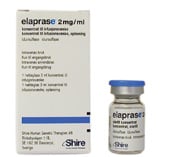 Rare disease specialist Shire ($SHPG) announced today that it has received Fast Track Designation from the FDA for a reformulated, intrathecally delivered version of its successful drug for Hunter syndrome, Elaprase.
Rare disease specialist Shire ($SHPG) announced today that it has received Fast Track Designation from the FDA for a reformulated, intrathecally delivered version of its successful drug for Hunter syndrome, Elaprase.
Right now the drug for Hunter syndrome, also known as MPS II, is delivered intravenously and does not cross the blood-brain barrier in clinically significant amounts, Shire says. The new, investigational version is administered directly into the spinal cord and is being developed for use with the currently approved formulation of Elaprase.
This drug delivery enhancement could add to the $545.6 million in sales the drug achieved in 2013. That represented annual sales growth of 10%, according to the company's earnings statement for that year.
The FDA's Fast Track Designation means that Shire will receive greater access to FDA officials during the development process and increases the candidate's chance of receiving priority review status at the time of its Biologics License Application.
To that end, next month Shire kicks off a two-year Phase II/III clinical trial of the candidate in pediatric patients with early cognitive impairment. It has an estimated enrollment of 42 patients, according to ClinicalTrials.gov.
However, the intrathecal delivery device for administration into the spinal cord has not been approved in the U.S. (though it has a CE mark), so patients in the treatment arm will receive 10 mg of the new formulation via lumbar puncture once a month until the device is approved for use in the U.S.
Patients in the control arm will receive standard weekly doses of Elaprase delivered intravenously, according to ClinicalTrials.gov. All patients in the trial must have received and tolerated Elaprase for at least the last four months to be eligible for the trial.
"This is not only the first treatment being investigated to address the significant unmet need of slowing the cognitive decline in MPS II patients, but also the furthest an intrathecal program for enzyme replacement has ever progressed," said Dr. Philip Vickers, Shire's head of research and development, in a statement. "This Fast Track Designation is further recognition of the critical need to develop new, effective therapy options for patients with Hunter syndrome with cognitive impairment."
- read the release
- here's more about the trial from ClinicalTrials.gov